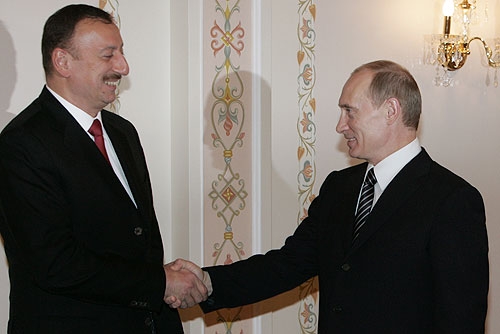Russia Wins Azerbaijan
With public attention focused primarily on the convolutions of the Rustavi-2 saga, the visits to Tbilisi of the presidents of two neighboring states in the space of one week – Serzh Sarkisian or Armenia on October 30 and Ilham Aliyev of Azerbaijan on November 5 – went virtually unnoticed by the general public and pundit community alike. This lack of attention and coverage is hardly surprising given the preoccupation of the general public with daily problems of unemployment, low income and other burning daily pursuits. Those more interested in international affairs are primarily concerned about EU visa liberalization chances and are apprehensive about growing – albeit slowly – Russian soft-power projections and creeping annexation.
So the reasons the two neighboring republics – one of them, Azerbaijan, being Georgia’s ‘strategic partner’ and reliable energy partner – end up at the back burner of the public eye are very simple. Neither of these countries aspires to NATO membership or closer integration with the European Union, which contrasts sharply with Georgia’s pro-Western ambitions. And neither suffers – directly at least – from Russia’s aggression, which could render Georgia and the victim companions in distress.
The very fact that regional neighbors do not share Georgia’s western orientation does not bode well for Georgia itself. The West would have been far more supportive and energetic had all three republics of the South Caucasus been pursuing the path of democratization and modernization. Indeed, one can hardly imagine the EU or NATO extending such massive support to Estonia with Latvia and Lithuania being Russia’s partners or members of the Non-Aligned Movement.
But what to me is far more unsettling is not the current state of affairs, but the trend: just a decade ago there was a hope, both in Washington and Brussels, that Armenia and Azerbaijan, despite the dependency on Russia of the former and problematic Human Rights record in the latter, would manage to sort out their problems and embark more resolutely on a westward quest. This optimism was based on the rational expectation that the leadership of both Baku and Yerevan did understand the longer-term benefits for their nations of the genuine western-style reforms and therefore they needed just a little bit of prodding on the part of the West that would ensure the requisite political will. But these sanguine beliefs have been dashed completely over the course of the last few years. In 2011 Azerbaijan joined the Non-Aligned Movement, thus signaling its lack of interest in becoming a part of the West. And in September 2013, the Armenian president abandoned years of negotiations with the EU over the Association Agreement and committed to the Russia-led Custom’s Union, which later transformed into the Eurasian Economic Union.
Since 2013, as the Azerbaijani authorities have intensified their crackdown on NGOs, independent and investigative journalists and human rights groups, Baku’s official anti-Western rhetoric has become so aggressive that it is reminiscent of the Soviet era. Phrases such as “corrupting influence of the West” are often touted by senior officials, including the President. Not surprisingly, the country is ranked 162nd out of 180 countries in the 2015 World Press Freedom Index, falling even behind Russia, which is ranked 152nd. Georgia and Armenia are far ahead, ranked 69th and 79th respectively.
All this proves that Russia won the strategic tug of war over Azerbaijan. It does not mean that we should expect an abrupt termination of the Baku-Tbilisi-Ceyhan or Baku-Tbilisi-Erzurum energy routes. Russia has achieved a far greater goal, namely ensuring that Azerbaijan will not even attempt to become a pro-western state in the observable future. More than alternative natural gas routes, Putin’s Russia fears an economically successful democratizing country on its post-Soviet periphery, because this might question the efficiency – and later legitimacy – of Putin’s ‘sovereign democracy’, the regime that stifles political pluralism and brings entire mass-media under state control. This paradigm is based on the notion that democracy and liberalism are essentially western phenomena and are inapplicable anywhere outside the West. So, successful transformation of a post-Soviet state along the lines of democracy and market economy is the biggest anathema for the Russian authorities.
For this very reason Putin’s genuine dislike of Georgia’s reforms started in 2005-2006, when the reforms started to deliver tangible results. He sensed the danger of these reforms becoming too successful and therefore capable of debunking the sovereign democracy myth. Hence the economic embargos on Georgian agricultural products, deportation en masse of ethnic Georgians and a series of natural gas price hikes. And when economic pressure did not work as intended, Russia attacked Georgia in 2008. This very line of reasoning explains Russia’s aggression against Ukraine. The Maidan Revolution created once again the danger of a ‘success story’ – and Putin acted to prevent this from happening.
But the cases of Georgia and Ukraine are ones where the Russian leader went to extreme lengths, because other means were exhausted. In case of Azerbaijan, Russia may boast “subduing the enemy’s resistance without fighting” – the words of Chinese military strategist Sun Tzu, ones Putin likes to quote. Capitalizing on the centrality of the Nagorno Karabakh problem, Russia gained in the eyes of Baku the role of the only broker that holds the key to the resolution – this was not difficult given the West’s overall disengagement with such post-Soviet conflicts. Selling weapons to Azerbaijan instills the latter with hope that Russia might not defend Armenia in case of resumption of hostilities. And the Russian leaders have never criticized Azerbaijani authorities even for the most dismal Human Rights abuses. These factors ensured Azerbaijan’s rabid anti-Westernism and growing authoritarianism, which is very much to Moscow’s liking, as it vindicates Putin’s spurious narrative.
George Mchedlishvili












